2023 top 10 reports on SDGs
2024-01-11GoldenBee责任编辑0
The year 2023 is full of turns and twists. As the end of COVID-19 pandemic was in sight, people’s work and life were gradually getting on the right track. At the midpoint of the implementation of the UN’s 2030 Agenda for Sustainable Development, new progress had been made on the 17 goals. To celebrate the World Environment Day 2023 themed on “solutions to plastic pollution”, an unprecedented campaign was launched worldwide to tackle plastic pollution. COP28 closed with a historic agreement to transition away from fossil fuels. The year also marks the tenth anniversary of the concept of building a community with a shared future for mankind.
There are more SDG topics worth exploring from these changes. Are flexible working hours at odds with business development? What progress has been made in the midpoint assessment of the 2030 Agenda? How much economic value will the construction of a circular economy bring? What will China's actions contribute to the community with a shared future for mankind? A number of international organizations have conducted insightful studies on these topics, and the following ten major reports reveal the challenges and opportunities in the face of new changes.
There are more SDG topics worth exploring from these changes. Are flexible working hours at odds with business development? What progress has been made in the midpoint assessment of the 2030 Agenda? How much economic value will the construction of a circular economy bring? What will China's actions contribute to the community with a shared future for mankind? A number of international organizations have conducted insightful studies on these topics, and the following ten major reports reveal the challenges and opportunities in the face of new changes.
01 Working Time and Work-Life Balance Around the World
(International Labor Organization, 2023-01-06)
(International Labor Organization, 2023-01-06)

Flexible working hours benefit the economy, enterprises and employees.
Working-time reduction and flexible working hours, such as measures taken during the COVID-19 pandemic, can benefit the economy, enterprises and employees and strike better and healthier work-life balance. The Report releases a series of updated data on working hours before and during the COVID-19 pandemic, and it is also the first to look at work-life balance. It is found that the working hours of a significant portion of the global workforce vary, either longer or shorter, compared to the standard 8 hours per day/40 hours per week. Nonetheless, slightly more than one third of the global workforce have more than 48 hours of work per week, while fully one fifth have short (part time) hours of work (less than 35 hours per week), and employees in informal economies can work either long hours or short hours.
02 Observation of Women’s Value in Sustainable Consumption and Production
(APEC Women, 2023-01-14)
(APEC Women, 2023-01-14)

Women directly affect the promotion of sustainable development at production and distribution links.
Since women tend to have higher demands on the quality of the ecological environment by virtue of their gender, they are crucial to promote sustainable development, as well as sustainable consumption and lifestyles. On one hand, more and more enterprises are establishing sustainable development systems with more women as key managers, which provides new directions for women to have higher decision-making power in business and society. On the other hand, as female consumers are the main force in the consumer market and are often the main managers of household consumption, their willingness to green consumption has a direct impact on the consumption and production structure of the whole society. With the progress of urbanization in China, young people are gradually becoming the backbone of society, which will cause an accelerated penetration of the awareness of sustainable consumption.
03 Beijing 2022 Post-Games Sustainability Report/Legacy Report (Post-Games): Olympic And Paralympic Winter Games Beijing 2022
(Beijing 2022 Organizing Committee, 2023-02-01)
(Beijing 2022 Organizing Committee, 2023-02-01)

The legacy left after the Beijing 2022 Winter Olympics inspires the world.
The Beijing 2022 Winter Olympics is the first Games to fully implement Olympic Agenda 2020 with focus on sustainability. The Beijing 2022 Post-Games Sustainability Report systematically summarizes modes and achievements of green, low-carbon and sustainable work in the preparation and hosting of the Beijing 2022 Winter Olympics, and introduces innovative ideas and practices of the sustainability management system of large-scale events, which will set a model for future sustainability management of such events. The Legacy Report (Post-Games) summarizes the development plans, major measures and proactive practices of the country and the host city in inheriting and making good use of the legacy left after the Winter Olympics in one year after the Games, continuing to promote and popularize ice and snow sports, advancing the sustainable development of the city and the region, and facilitating the progress of social civilization.
04 Sixth Assessment Report Synthesis Report
(Intergovernmental Panel on Climate Change, 2023-03-20)
(Intergovernmental Panel on Climate Change, 2023-03-20)

Justice is one of the core elements of climate governance.
The influencing factors and impacts of climate change are unevenly distributed. Although countries in the Southern Hemisphere are not solely responsible for the current climate crisis, they are bearing the brunt of the consequences. Intergenerational inequalities are also likely to exist. On average, the extreme weather events that children born today may experience in their lifetime could be several times more than those of their grandparents. To tackle the increasingly urgent climate crisis, adaptation to new environments and reduction of greenhouse gas emissions must be implemented hand in hand. The Report notes that near-term action on accelerating climate change adaptation is critical to narrowing the gap between existing adaptation measures and what is needed. Moreover, justice is one of the core elements of climate governance and one of the key solutions.
05 UN World Water Development Report 2023
(UNESCO on behalf of UN-Water, 2023-03-21)
(UNESCO on behalf of UN-Water, 2023-03-21)
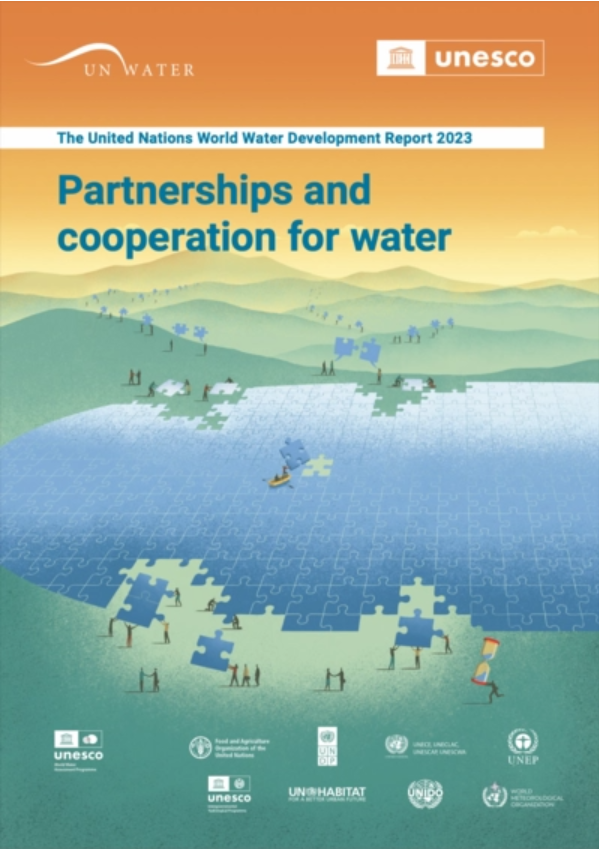
Joint actions have been taken to promote the sustainable development of water resources.
Water use has been increasing worldwide by about 1% per year over the past 40 years, and the global urban population facing water scarcity is projected to potentially double from 930 million in 2016 to between 1.7 and 2.4 billion people in 2050, jointly driven by population growth, socio-economic development and changing consumption patterns. Around 2 billion people around the world do not have access to clean and safe drinking water, approximately 3.6 billion people lack adequate sanitation services, and between 2 and 3 billion people worldwide experience water shortages for at least one month of the year. The only way to prevent a global water crisis in the coming decades is to strengthen international cooperation on how water resources are used and managed. Only through sustainable water resource management can water, food and energy security be ensured, and clean drinking water and sanitation services be provided to all.
06 Turning off the Tap: How the world can end plastic pollution and create a circular economy
(UNEP, 2023-05-16)
(UNEP, 2023-05-16)

Plastic pollution can be cut by 80% by 2040 through policy shifts and market adjustments.
If countries and enterprises can utilize existing technologies to promote policy and market transformations, plastic pollution can be cut by 80% by 2040.The Report suggests to reduce the most problematic and unnecessary plastic uses. It also calls for a market transformation towards circularity in plastics by accelerating three key shifts: Reuse, Recycle, and Reorient and Diversify. The global shift to a circular economy will result in USD 1.27 trillion in savings. A further USD 3.3 trillion is saved from avoided externalities such as health, climate and air pollutions. By 2040, it is estimated that such a shift could create 700,000 additional jobs, mostly in low-income countries, and significantly improve livelihoods for millions of workers in informal settings.
07 Progress Report on the Global Development Initiative 2023
(Center for International Knowledge on Development, 2023-06-20)
(Center for International Knowledge on Development, 2023-06-20)
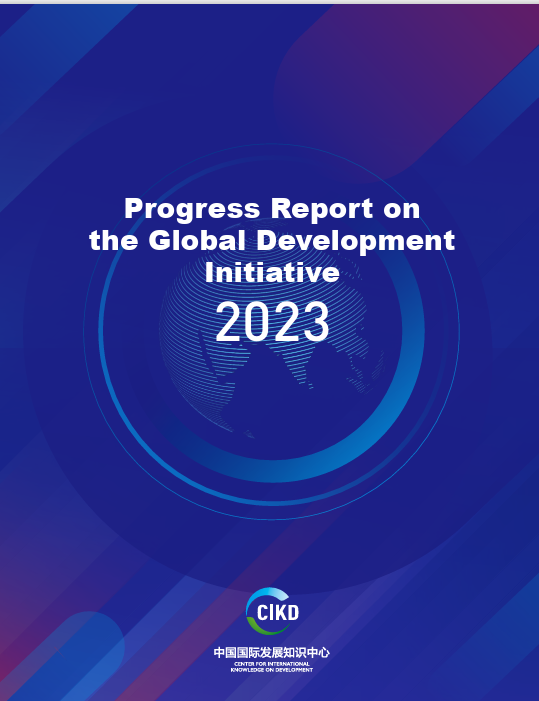
The Report aims to contribute China’s wisdom and strength to global development.
Since the Global Development Initiative was proposed by China in September 2021, its ideological connotation has been continuously enriched, its implementation mechanism has been continuously improved, its development path has become clearer, and its practical cooperation has been gradually put into practice. In the past two years, China, together with its partners, has built cooperation platforms, constructed partnerships, increased financial support, carried out capacity building and implemented livelihood projects in eight key areas. The Report recommends that China should continue to forge a consensus on prioritizing development and accelerating the implementation of the 2030 Agenda, effectively mobilize and allocate resources to maximize synergies for development, deepen practical cooperation to bring tangible benefits to all countries involved, especially developing countries, and adhere to the principle of promoting knowledge-based development to strengthen the sharing and exchanges of experience and development knowledge.
08 Sustainable Development Report 2023
(Sustainable Development Solutions Network, 2023-06-21)
(Sustainable Development Solutions Network, 2023-06-21)
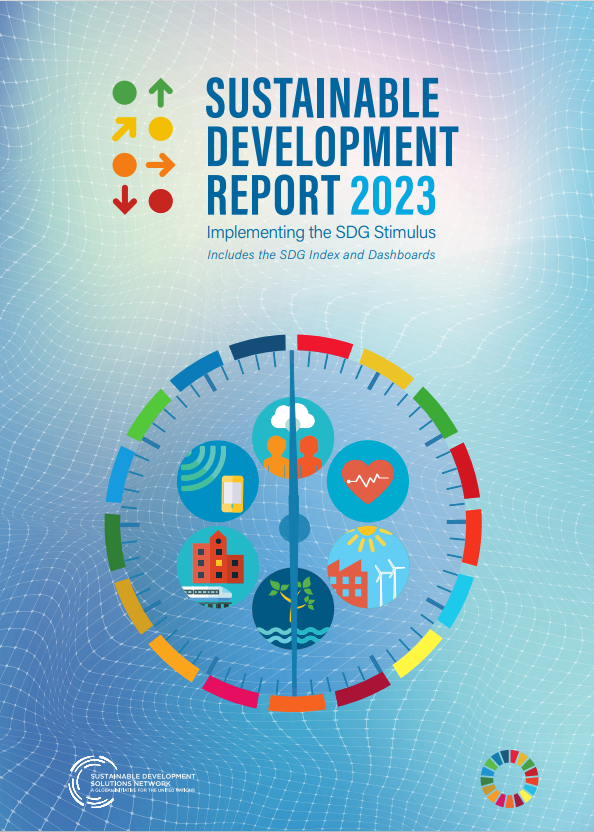
The realization of the SDGs requires scaling up development financing.
At the midpoint assessment of the 2030 Agenda in 2023, global progress on the realization of the SDGs was still far from sufficient. At its heart is an investment agenda which requires that UN Member States must adopt and implement the SDG Stimulus. The SDG Stimulus seeks to urgently address the shortage of international financing for the SDGs in low-and middle-income countries, with a minimum of USD 500 billion in extra financing by 2025. All countries should take advantage of the momentum to review and revise their national SDG strategies and make a commitment to strengthen multilateralism. At the same time, all countries should further invest in data and statistical capacity-building to support a long-term transformation pathway for key SDGs.
09 A Global Community of Shared Future: China's Proposals and Actions
(State Council Information Office, 2023-09-26)
(State Council Information Office, 2023-09-26)
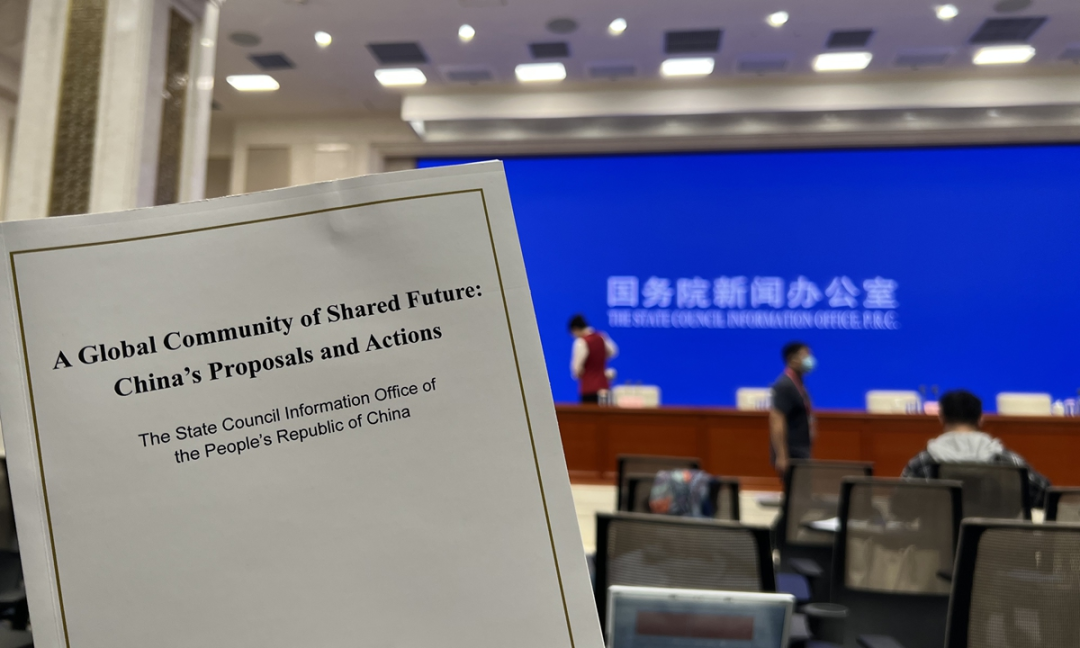
The concept of a community with a shared future for mankind features more prominent contemporary value.
The year 2023 marks the 10th anniversary of the proposal of building a community with a shared future for mankind. The Report comprehensively introduces the ideological connotation and vivid practices of building a community with a shared future for mankind, aiming to enhance understanding and comprehension in the international community and forge a broad consensus. China has made a five-point proposal for building a global community of shared future in the areas of partnerships, security environment, development, inter-civilization exchanges, and ecosystem. This has opened up new prospects for international exchanges. A world of common prosperity should be built through win-win cooperation, which means bidding farewell to the winner-takes-all mindset and sharing development achievements. An open and inclusive world should be constructed through exchanges and mutual learning, which means bidding farewell to the mindset that one civilization is superior to another and starting to appreciate the strengths of other civilizations. Green and low-carbon development should be pursued to make this world clean and beautiful, which means bidding farewell to the destructive exploitation of resources and preserving and enjoying the lush mountains and lucid waters.
10 Global Cooling Watch 2023
(UNEP-led Cool Coalition, 2023-12-05)
(UNEP-led Cool Coalition, 2023-12-05)
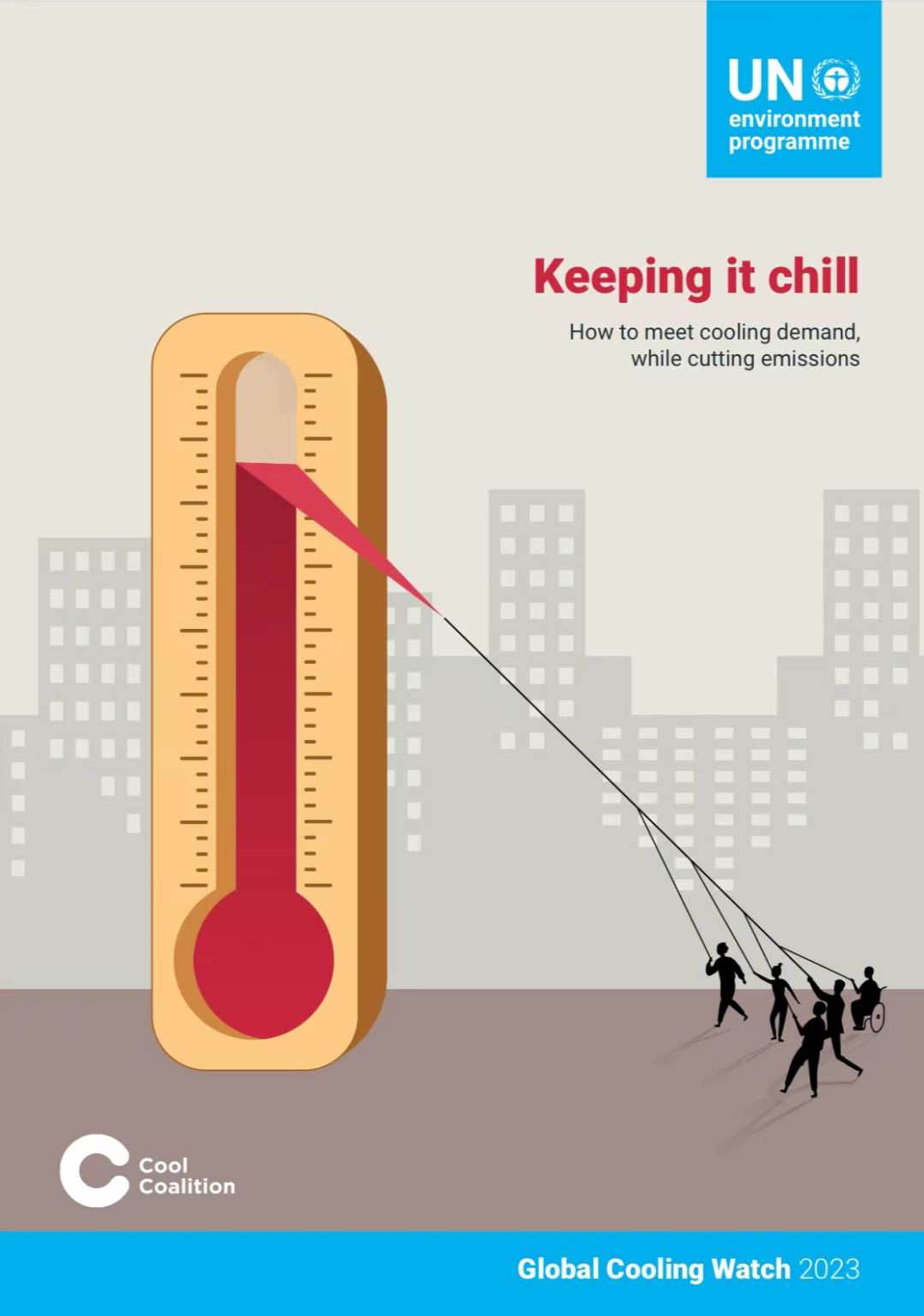
How to meet cooling demand while cutting emissions.
Taking key measures to reduce the power consumption of cooling equipment would cut at least 60 percent off predicted 2050 sectoral emissions, provide universal access to life-saving cooling, take the pressure off energy grids and save trillions of dollars by 2050, according to the Report published during the COP28 climate talks in Dubai. The Report lays out sustainable cooling measures in three areas: passive cooling, higher-energy efficiency standards, and a faster phase down of climate-warming refrigerants. Following the measures outlined in these areas would deliver the 60 percent cuts; adding rapid power grid decarbonization would reduce sectoral emissions by 96 percent.
(Sorted by the release date)
Source: China Sustainability Tribune
All images are sourced from the internet.
Best Practices
- The 100-year brand — Air Liquide also has a sense of juvenile
- Beijing Public Transportation Corporation: Developing green transportation to build a harmonious and livable capital
- CGN: Building a modern factory in barren deserts and developing a new win-win cooperation model along “Belt and Road”
Upcoming Event

All the materials on the site “Source: XXX (not from this site)” have been reprinted from other media. They do not imply the agreement by the site.
All the materials with “Source: CSR-China Website” are the copyright of CSR-China Website. None of them may be used in any form or by any means without permission from CSR-China Website.
GoldenBee Official WeChat
Copyright © Csr-china.net All Right Reserved.
京ICP备19010813号










